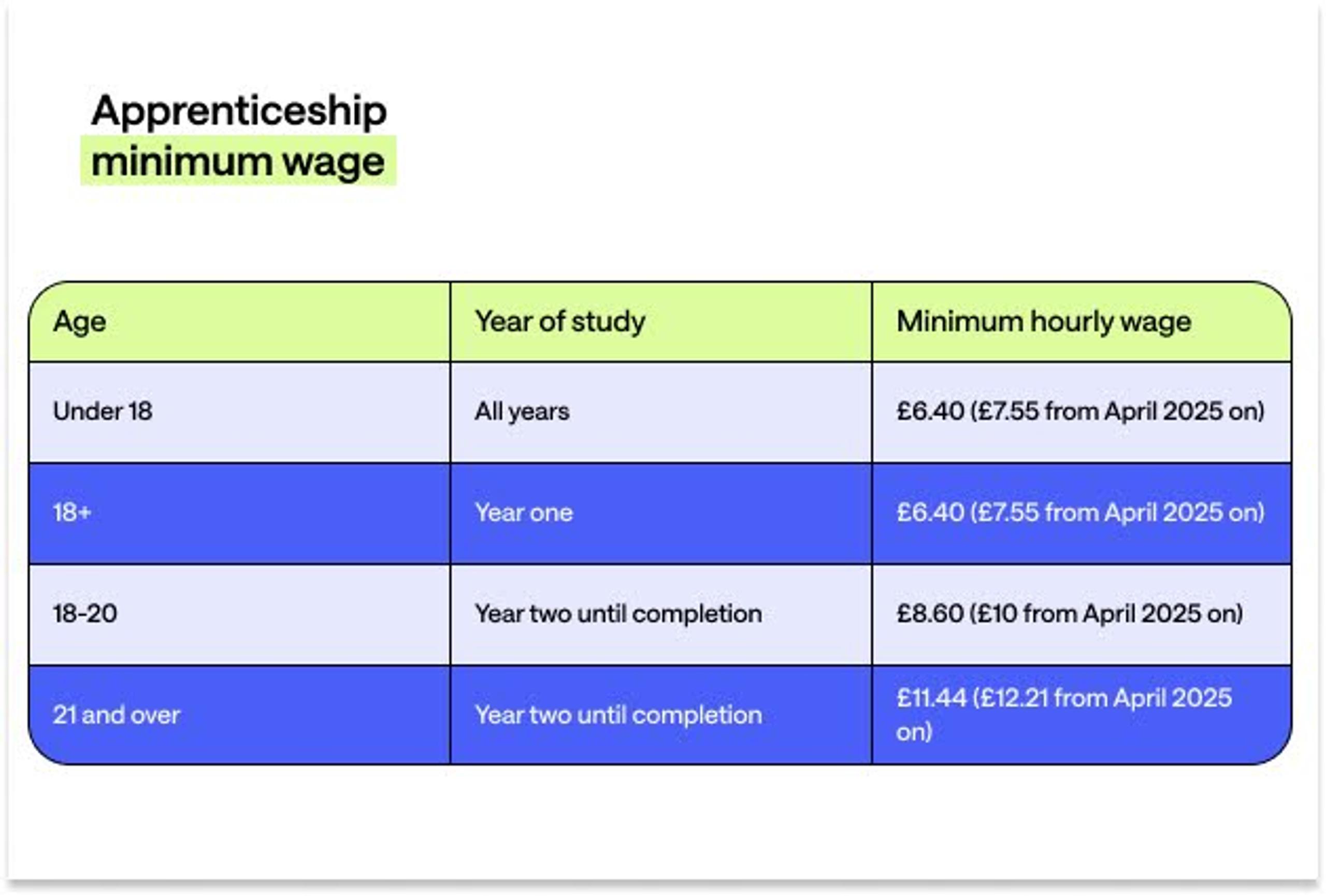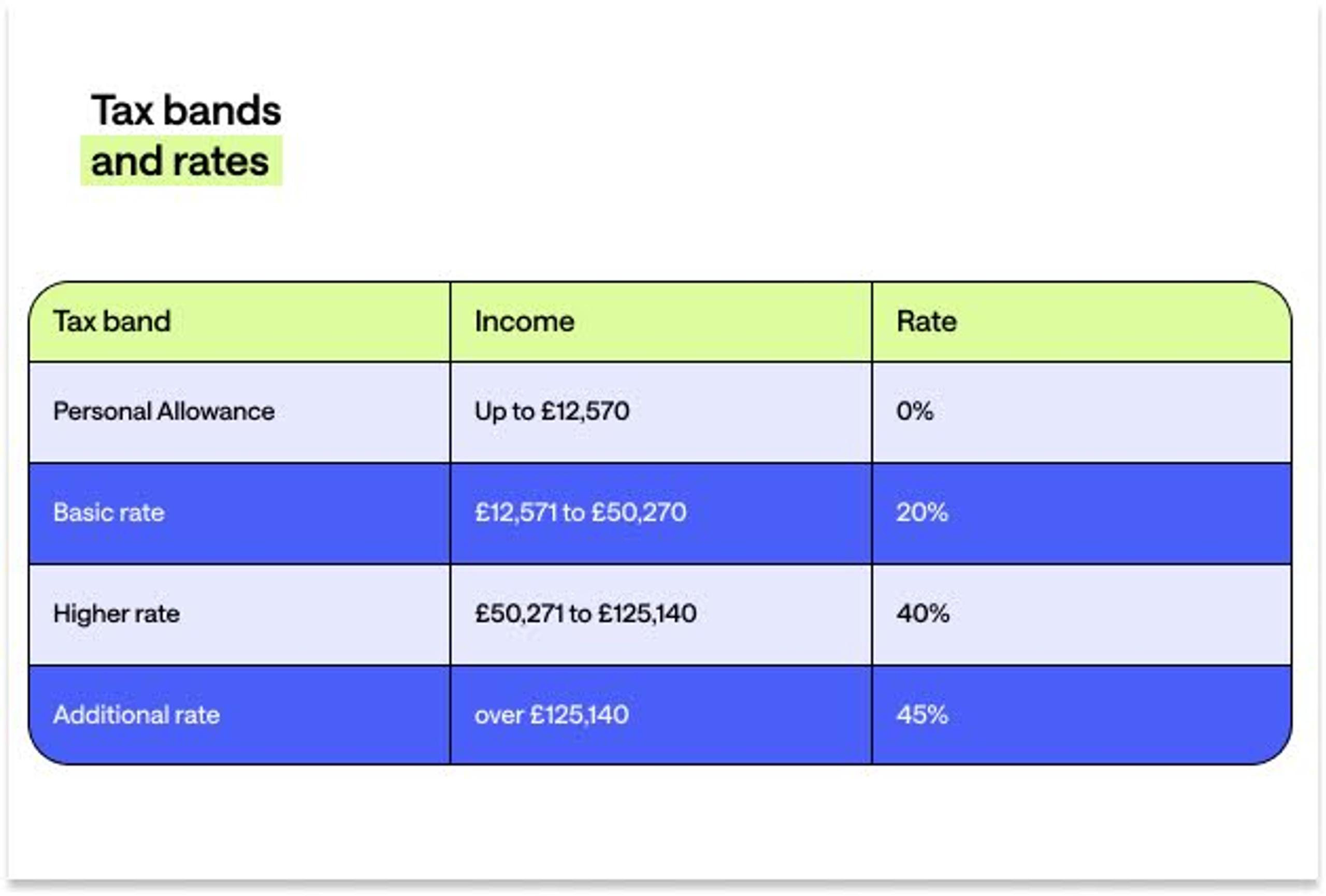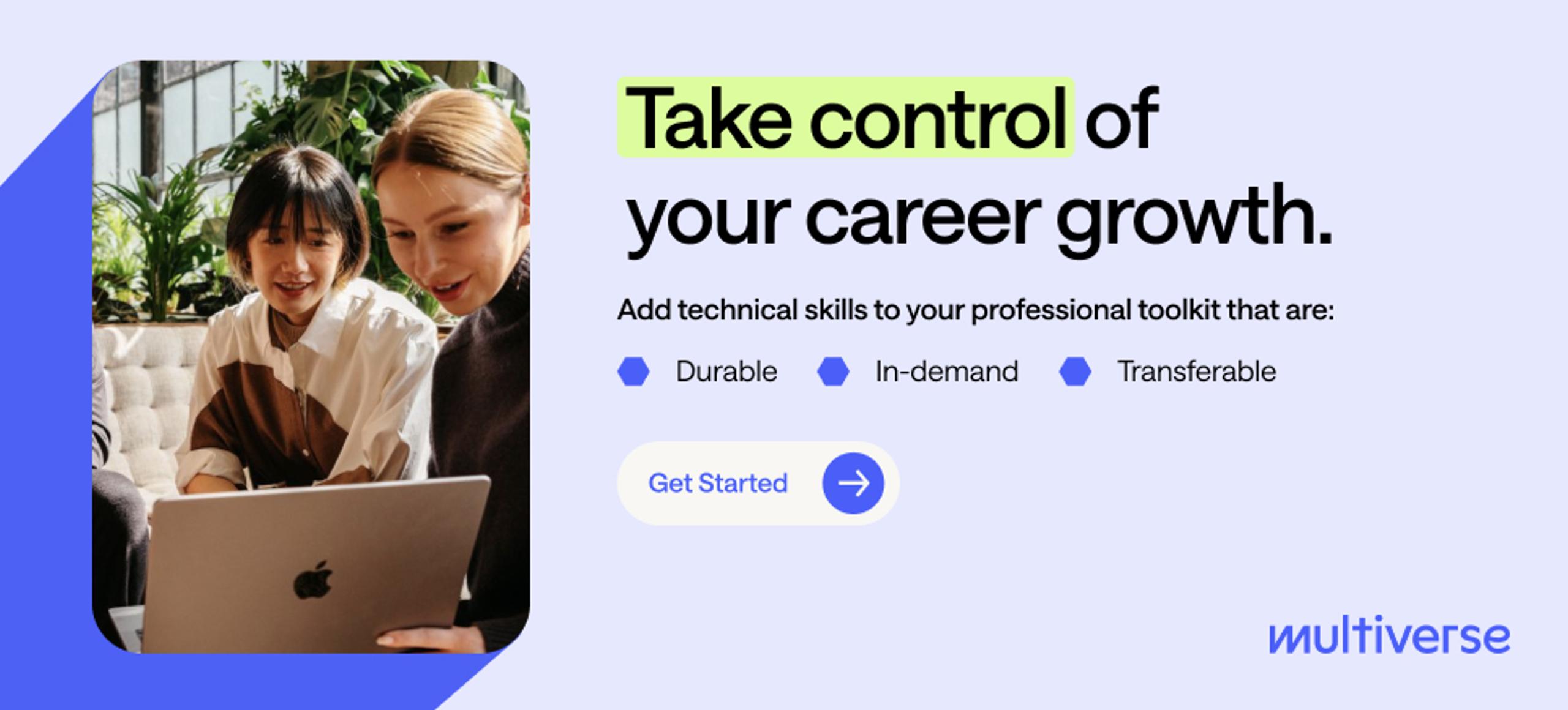Contents
As an apprentice, you can earn a salary while you learn and gain a competitive advantage in the job market. One question that’s always top of mind for potential applicants: How much do apprentices get paid?
The short answer: It depends.
High-growth industries, like tech, may pay over £25,000 for entry-level apprenticeship roles. Apprenticeship opportunities in other industries might pay less. Your apprenticeship wage also depends on what company you work for and the level of your position.
To help you understand how much you could earn as an apprentice, we'll guide you through the following:
- What’s the apprenticeship minimum wage?
- Can apprentices earn more than the minimum wage?
- Multiverse apprenticeship wages
- How much money will you make as an apprentice?
- Apprentice working hours
- What else are apprentices entitled to?
- Is an apprenticeship right for you?
- What happens when I finish my apprenticeship?
- How to start your apprenticeship journey
What’s the apprenticeship minimum wage?
The apprenticeship minimum wage is the basic hourly amount employers must pay apprentices. The minimum pay depends on your age and how long you’ve been an apprentice.
For example, in 2024, the apprentice wage for those aged under 18 is £6.40 per hour. But if you’re 19 or over and have completed your first year, you’re entitled to the National Minimum Wage(opens new window) for your age group.
Here’s a breakdown of the minimum hourly wage for apprentices depending on your age and year of study. Note: these figures represent the minimum hourly wage for 2024. The 2025 minimum wages, which go into effect in April 2025, are also listed.

In the UK, the National Minimum Wage is updated each April. Apprentices aged 21 and over who’ve completed the first year of their apprenticeship are eligible for the National Living Wage.
Can apprentices earn more than the minimum wage?
The National Minimum Wage for apprentices is the minimum your employer must pay you. Many organisations (including Multiverse) pay you much more than the National Minimum Wage rate to complete your apprenticeship. For instance, if you’re entering a high-growth and in-demand field like tech, wages tend to be higher than the minimum.
Multiverse apprenticeship wages
At Multiverse, the companies we work with pay a minimum of £18,000 a year. But you’ll find roles on our platform (opens new window)that pay £25,000 or more per annum (per year). We focus on the skills of the future, offering high-quality apprenticeship opportunities across key sectors like Business, Digital and Tech.
Multiverse programmes include:
How much money will you make as an apprentice?
Let’s break it down. Your apprenticeship salary is the amount an employer pays you yearly before income tax and other deductions like National Insurance. How much income tax you pay depends on which tax band you’re in, and your total earnings determine your tax band.
You’re likely in the basic band if you’re working in an entry-level role. In the basic band, you’re taxed on income between £12,571 to £50,270(opens new window). You don’t pay tax for income below £12,570 (your tax-free Personal Allowance limit). The UK Government taxes earnings in this threshold at 20%.
You’re in the next tax band (the higher rate) if you earn above the basic rate threshold. In the higher rate tax band, you’ll be taxed 40% for income between £50,271 and £125,140. An additional rate of 45% applies to incomes over £125,140.

Now for the maths. Let’s say your salary is £20,000 per annum (per year), and you’re doing an apprenticeship lasting 15 months. Yearly you’ll take home around £17,624 after tax and National Insurance. Monthly you’ll take home around £1,468. Throughout your entire apprenticeship, you’ll earn £22,020.
Apprentice working hours
To complete your apprenticeship full-time, you are typically expected to work at least 30 hours per week. However, if you have specific circumstances (for example, if you’re a carer for a family member), you may be able to work part-time. For part-time apprentices, such as those working 16 hours per week, the apprenticeship duration will be extended to ensure adequate training time.
Your employer must follow employment regulations regarding your working hours:
- Under 18: As a young worker, you can legally work a maximum of 8 hours per day and 40 hours per week.
- 18 and Over: For adults, the standard working limit is an average of 48 hours per week(opens new window), though you may choose to opt out if desired.
In addition to your set working hours, apprenticeships require that you dedicate at least 20% of your working time to training or studying for your qualification. In a Multiverse programme, you’ll typically spend at least one day a week studying toward your apprenticeship qualification.
What else are apprentices entitled to?
Whether you complete your apprenticeship full-time or part-time, your employer will pay you for working and training hours. Aside from being paid to complete your apprenticeship, you’re legally entitled to employee benefits like holidays, sick pay and rest breaks.
Training
As an apprentice, you’ll be paid for your time at work. You’re also paid for the time you’re in coaching sessions and bootcamps with industry experts (off the job training). You’ll spend 80% of your time working for your employer and 20% of your time doing off the job training. You’ll also be paid for time working towards English and Maths qualifications if they’re part of your apprenticeship.
Holidays
As a full-time apprentice, you’re entitled to a minimum amount of paid holiday. For each year of your qualification, you’ll get at least 20 days of holiday pay plus bank holidays. Many employers provide apprentices well above the minimum paid holiday and offer company-wide shutdowns once a year.
Sick pay
If you’re too ill to work, sick pay offers peace of mind. You’re entitled to Statutory Sick Pay (SSP)(opens new window) as an apprentice. The minimum amount is £116.75 a week for 28 weeks. Some companies offer sick pay schemes that pay more than the basic weekly amount. For example, an employer might offer up to two weeks of paid sick leave at your usual weekly rate.
Rest breaks
You’re legally entitled to rest breaks at work like any other employee. If you’re under 18 and your working day is longer than 4.5 hours, your employer must give you a 30-minute break. If you’re 18 or over(opens new window), you’ll get a 20-minute break if you work more than six hours daily. As with holiday and sick pay, many companies will offer apprentices above the minimum amount. For instance, you might get up to an hour for lunch and shorter breaks throughout the day.
Is a Multiverse apprenticeship right for you?
There’s never been a better time to start your apprenticeship journey. A Multiverse apprenticeship enables you to learn the skills you need to level up your career without taking time away from your current role. To top it off, you’ll continue to be paid for the time you spend learning on the job. All training is paid for by your employer once they partner with Multiverse.
Train in high-growth industries
Apprentices are in demand across the board, especially in high-growth sectors. Let’s take the tech industry as an example. In 2024, there were 122 “unicorn” startups — startups with a valuation of $1 billion (roughly £770 million) — in the UK alone. The UK tech sector is still growing in 2024, and companies need new, diverse talent. AI is also driving high levels of investment by tech companies. According to Multiverse data, 81% of tech leaders plan to increase investments in AI(opens new window) — including on human capital — over the next three years.
Get paid to learn
All apprentices get paid to work and learn. Some industries pay more than others. Companies with a skills gap will happily pay you to complete your apprenticeship and gain industry expertise in your field.
What happens when I finish my apprenticeship?
After you finish your apprenticeship, you may be in a position to grow your career through a new role or promotion. Promotions usually come with a pay rise as compensation for your increased experience and responsibilities. Having a new qualification will help you now and for the rest of your career.
Start your apprenticeship journey
If you're looking to gain new and exciting skills on the way to future-proofing your career in the dynamic tech industry, apply for a Multiverse programme(opens new window) in minutes today.







